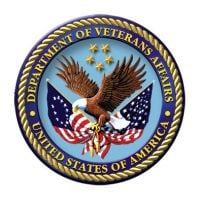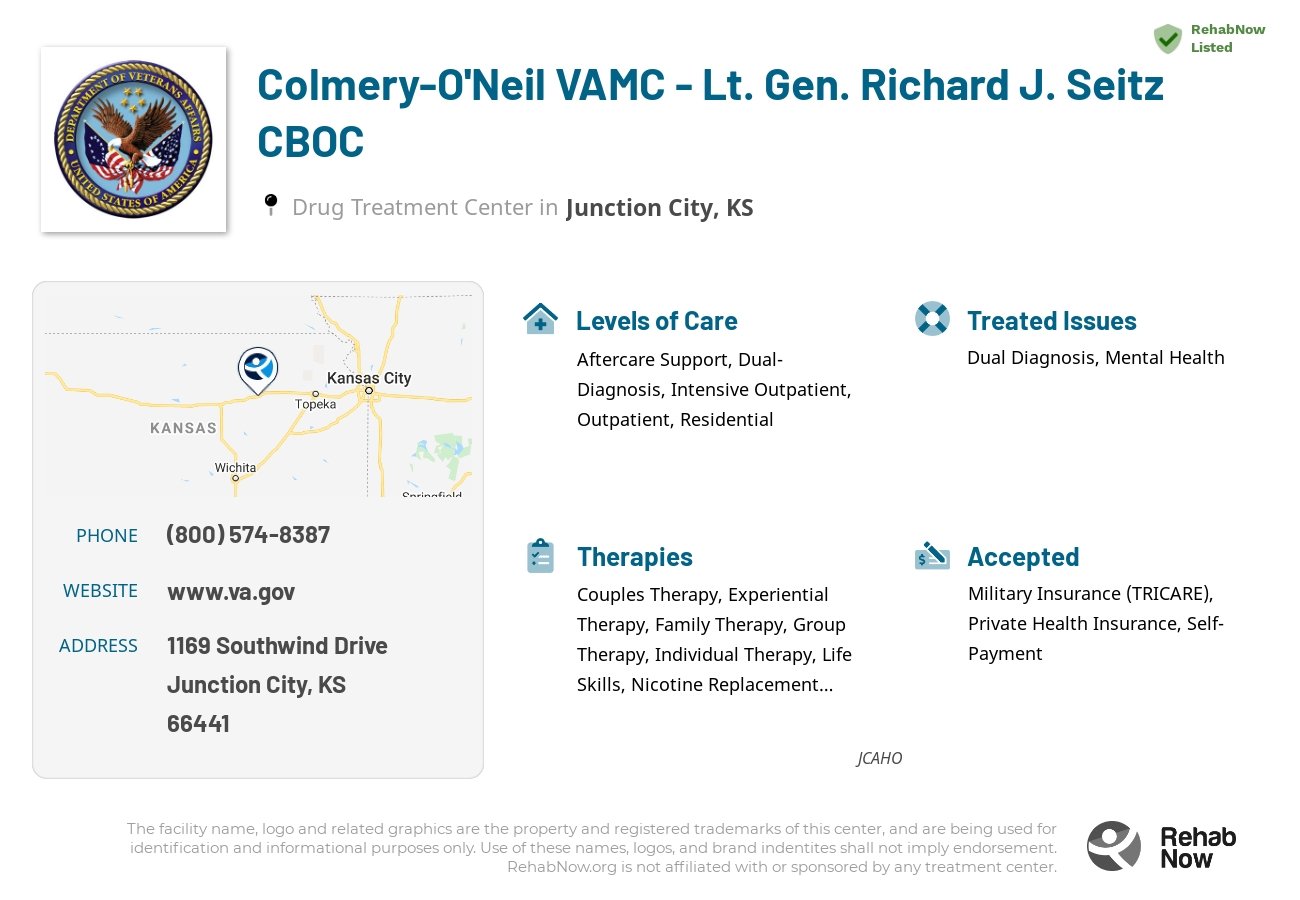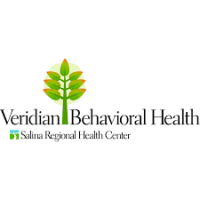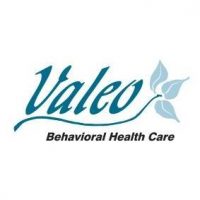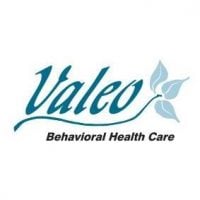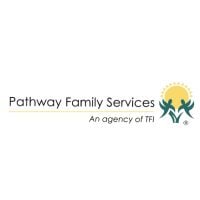Colmery-O'Neil VAMC - Lt. Gen. Richard J. Seitz CBOC
Drug Rehab Center in Junction City, Kansas
The Colmery-O'Neil VAMC in Junction City, Kansas provides a variety of medical services, including a comprehensive and evidence-based addiction treatment program for veterans and active duty service members that includes individual and group therapy, relapse prevention planning, and 12-step meetings, as well as alternative and supplemental treatments like yoga and mindfulness-based practices.
About Colmery-O'Neil VAMC - Lt. Gen. Richard J. Seitz CBOC in Kansas
Colmery-O'Neil VAMC - Lt. Gen. Richard J. Seitz CBOC is a Veterans Affairs Medical Center located in Junction City, Kansas. This facility provides a variety of medical services, including primary care, mental health, dental and optometry services. Additionally, the center provides a unique program for veterans and active duty service members to receive treatment for substance abuse and addiction.
The Colmery-O'Neil VAMC - Lt. Gen. Richard J. Seitz CBOC offers a comprehensive, evidence-based approach to addiction treatment. Their treatment plans are designed to help individuals transition to a recovery lifestyle, and include individual and group therapy, relapse prevention planning, and 12-step meetings. The facility also offers alternative and supplemental treatments, such as yoga and mindfulness-based practices, to further aid in the recovery process.
Colmery-O'Neil VAMC - Lt. Gen. Richard J. Seitz CBOC has received many accolades and awards for their high-quality services. The facility is accredited by the Joint Commission, and is also licensed by the Department of Veterans Affairs to provide substance abuse treatment services. Additionally, the center has been recognized for its excellence in addiction treatment and has been nominated for multiple awards.
Genders
Ages
Modality
Additional
Accreditations

JCAHO
Conditions and Issues Treated
Individuals who are addicted to drugs and/or alcohol often have one or more co-occurring mental health disorders. Addressing both the addiction and the mental health problems at facilities like Colmery-O'Neil VAMC - Lt. Gen. Richard J. Seitz CBOC can be very beneficial for these individuals.
Common mental health conditions that often co-occur with addiction include:
- Anxiety Disorders – People with drug and alcohol problems often suffer from anxiety disorders such as panic disorder, obsessive-compulsive disorder, social anxiety disorder, and generalized anxiety disorder.
- Depression – One of the most common mental illnesses co-occurring with addiction is major depressive disorder.
- Attention-deficit hyperactivity disorder (ADHD) – Many people with drug and alcohol problems also suffer from ADHD.
- Bipolar Disorder – People with bipolar disorder are more likely to suffer from drug and alcohol problems than the general population, and vice versa.
Levels of Care Offered
This center offers a variety of custom treatment tailored to individual recovery. Currently available are Aftercare Support, Dual-Diagnosis, Intensive Outpatient, Outpatient, Residential, with additional therapies available as listed below.
An intensive outpatient treatment program, or IOP, is set up for those struggling with an addiction to begin the recovery process. However, the patient will not live at the facility during treatment.
IOP involves patients coming in and out of a medical office building regularly to receive therapy and other services while continuing their life outside of these visits.
IOP is a step up from drug detoxification or alcohol detox. However, it’s still considered a phase of recovery rather than the ultimate goal. There are many rehabs and treatment facilities available to patients in need of IOP.
Outpatient treatment can be considered the lowest intensity level of addiction treatment in Junction City, KS. It is ideal for early phase addiction or lower intensity addictions. Colmery-O'Neil VAMC - Lt. Gen. Richard J. Seitz CBOC peer group support, 12-step programs, and individual counseling are likely to be involved.
Residential treatment programs are those that offer housing and meals in addition to substance abuse treatment. Rehab facilities that offer residential treatment allow patients to focus solely on recovery, in an environment totally separate from their lives. Some rehab centers specialize in short-term residential treatment (a few days to a week or two), while others solely provide treatment on a long-term basis (several weeks to months). Some offer both, and tailor treatment to the patient’s individual requirements.
Aftercare support is vital to those who have completed a drug or alcohol treatment program. This support comes in individual and family counseling, treatment of psychiatric and other medical conditions, and medications to reduce cravings. It helps recovering addicts adjust to normal day-to-day activities and can last for a year or longer.
The majority of drug and alcohol addicts who receive aftercare treatment do not relapse. It is estimated that without aftercare, the relapse rate will be between 70 to 90 percent for most people. Aftercare is the final stage in addiction recovery, but it will also help maintain sobriety if relapse does occur.
Therapies & Programs
Individual therapy is ideal for addicts who want to focus on themselves. It can also be helpful for those whose withdrawal symptoms are exacerbated by the presence of other people.
Benefits of individual therapy are:
- Access to a personalized treatment plan that focuses on the individual needs of the addict
- More privacy during treatment sessions
- Better personal development through introspection
- Increased self-awareness regarding addictive tendencies in order to avoid relapse
- Greater potential for a long-term recovery plan
- Receiving professional advice and detox assistance from medical staff
Couples therapy is a treatment method used to help couples in which at least one member of the couple has a drug addiction. Couples therapy can be used whether the addicted partner is using drugs or in recovery. An additional benefit of couples therapy is that it can help make other types of treatment, such as 12-step programs, more effective.
Family therapy can help you and your family deal with old issues that may trigger substance abuse. The idea behind family therapy for drug addiction is that you are never fully healed from substance abuse until you’ve healed your relationship with your family, too. To get sober, you need to find a different way to cope with the pain in your life.
This is when a group of people in various stages of recovery meet up and discuss their experiences, triggers, successes, failures, and even alternative therapies! Unlike support groups where everyone already knows each other, group therapy is conducted along side outpatient or inpatient treatment at Colmery-O'Neil VAMC - Lt. Gen. Richard J. Seitz CBOC.
Trauma therapy is a clinical process that helps individuals deal with mental stress often caused by traumatic events. The therapist helps the person identify, understand and work through the problem. This is done with the help of talking about it in group or one-on-one counseling sessions.
Therapists use relaxation, role-playing, art, and music to help the person open up about what is bothering them. Some examples include:
- Talking about the traumatic event and how it affected them.
- Helping those who have PTSD to deal with their nightmares and recurring memories.
- Working with individuals to resolve the issues triggering the stress, whether seeing someone who reminds them of what happened or feeling helpless.
The individual is also encouraged to help others that are struggling with similar problems. This often helps them feel empowered and gives them hope.
Trauma therapy is not for everyone; it is usually reserved for people who have recently experienced a traumatic event and struggle to get over it. It is generally done for children, teenage victims of sexual assault, and war veterans.
CBT is a psychotherapy approach and method. [ws-nap-name] people to examine how their thoughts, including habitual harmful and inaccurate thinking, affect their actions. CBT is based on the idea that rigid, inflexible thinking leads to poor stress management, which leads to emotional distress.
Similarly, CBT helps people identify and change negative behaviors. It makes you question your perceptions and ask if they are realistic. CBT asks people to examine their behaviors and emotional responses and how they affect their lives. CBT aims to change people’s thinking and behavior to lead a more balanced and healthy life.
Moreover, CBT has been shown to reduce anxiety disorders, depression, and symptoms associated with harmful thoughts or actions.
Those struggling with addiction can benefit from learning certain life skills. It is not as simple as quitting drinking or taking drugs and thinking that the hard part is over. Being sober means living a whole new way of life. Many recovering addicts have found that they need to develop talents like time management, organization, communication skills, socialization skills, and self-esteem to make their life in sobriety work, Colmery-O'Neil VAMC - Lt. Gen. Richard J. Seitz CBOC is here to help with that.
Nutrition therapy has been used to help drug addicts for decades. Many early reports on addiction treatment indicate that some patients recovered from the “satisfying power of food”. For years, this phenomenon has been utilized as a treatment modality in eating disorders for adults, adolescents, and children. Specific nutrients have been identified that influence neurotransmitters associated with reward pathways of the brain.
Studies have shown that carbohydrate loading with complex carbohydrates to elevate serotonin levels was effective in treating bulimia nervosa. This approach prompted researchers to explore the use of this type of nutritional intervention in other disorders.
Nicotine replacement therapy is a drug treatment that allows people to get the effects of nicotine without chewing or smoking. The therapy is often done with a patch, and doses of nicotine are reduced until nicotine is no longer needed. NRT helps smokers get nicotine into their system without resorting to smoking, and it has been shown to be an effective way to help people quit smoking. Coupling NRT with counseling and other means of support gives long-term smokers a better chance of removing their unhealthy habit.
Patient Experience
Experiential Therapy at Colmery-O'Neil VAMC - Lt. Gen. Richard J. Seitz CBOC
Experiential Therapy is a type of therapy that involves activity to recreate situations that may have caused trauma or negative emotions. Experiential therapy at Colmery-O'Neil VAMC - Lt. Gen. Richard J. Seitz CBOC in Junction City, KS can involve acting, props, arts and crafts, animal care or other tools that may be effective. This therapy is done on an individual basis and can help revisit and heal from past traumas. Trust between the therapist and individual is important for success. Experiential therapy can help you more closely become you and move through life positively and authentically.
Payment Options Accepted
For specific insurance or payment methods please contact us.
Is your insurance accepted?
Ask an expert, call (888) 674-0062
Additional Details
Specifics, location, and helpful extra information.
Junction City, Kansas 66441 Phone Number(800) 574-8387 Meta DetailsUpdated November 25, 2023
Staff Verified
Colmery-O'Neil VAMC - Lt. Gen. Richard J. Seitz CBOC Patient Reviews
There are no reviews yet. Be the first one to write one.
Junction City, Kansas Addiction Information
About 42% of adults in Kansas have tried an illicit drug at some point in their lives. 12.4% of the state population uses illegal drugs and 4.5% abuse alcohol in a given year. 15.16% of all deaths in Kansas between 2008 and 2017 were caused by either drugs or alcohol.
CDC: 9.4% of adults over 18 in Junction City, Kansas have some form of substance dependence or abuse. Prescription painkillers, such as oxycodone and hydrocodone, are responsible for more deaths than cocaine and heroin combined. In 2015, there were 1,532 drug overdose deaths in Kansas.
Treatment in Nearby Cities
- Columbus, KS (168.3 mi.)
- Humboldt, KS (113.5 mi.)
- Anthony, KS (143.4 mi.)
- Mayetta, KS (65.2 mi.)
- Hutchinson, KS (87.5 mi.)
Centers near Colmery-O'Neil VAMC - Lt. Gen. Richard J. Seitz CBOC
The facility name, logo and brand are the property and registered trademarks of Colmery-O'Neil VAMC - Lt. Gen. Richard J. Seitz CBOC, and are being used for identification and informational purposes only. Use of these names, logos and brands shall not imply endorsement. RehabNow.org is not affiliated with or sponsored by Colmery-O'Neil VAMC - Lt. Gen. Richard J. Seitz CBOC.
